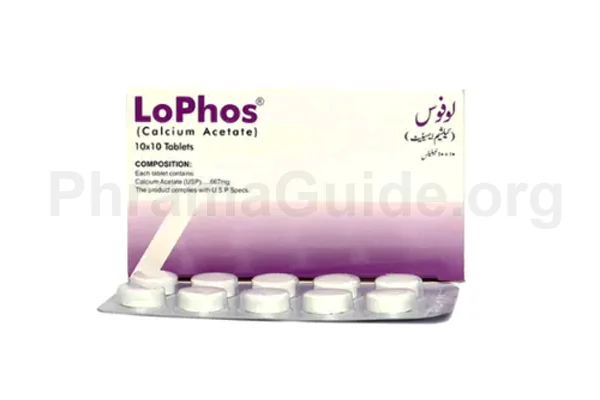Lophos tablet is a medication that is used to control high blood phosphate levels in people with end-stage renal disease (ESRD) who are on dialysis. It helps kidneys to filter out excess phosphate from the blood and remove it through urine. Following are some approved and off-label uses of Lophos Tablet:
Approved Uses of Lophos Tablet
- Hyperphosphatemia in Chronic Kidney Disease (CKD): Lophos tablet commonly used is in the treatment of hyperphosphatemia in patients with CKD, particularly those on dialysis. In CKD, the kidneys are unable to effectively filter and excrete phosphate, leading to elevated levels in the blood.
- Chronic Kidney Disease Mineral and Bone Disorder (CKD-MBD): CKD-MBD refers to a range of skeletal and mineral abnormalities that occur as a result of chronic kidney disease. Hyperphosphatemia is a common feature of CKD-MBD, and Lophos tablets can help control phosphate levels in these patients, which contributes to the management of bone abnormalities.
Off-label Uses of Lophos Tablet
- Calcium Supplementation: In some cases, Lophos tablets may be used as a source of supplemental calcium, particularly when an individual has low calcium levels or an increased requirement for calcium due to factors such as malabsorption or nutritional deficiencies.

What is Lophos?
Lophos is one of the leading brands of Calcium Acetate, manufactured and marketed by RG Pharmaceutica (Pvt) Ltd, Pakistan.
Lophos Alternatives : Other Similar Brands
Below are some availble similar brands that can be used as an alternative to Lophos:
- Urophos : (CCL) Consolidated Chemical Laboratories (Pvt) Ltd, Pakistan.
- Phoslo : Phaemasol (Pvt) Ltd, Pakistan.
- Calci-Tab : Biovencer Healthcare (Pvt) Pakistan.
Lophos : Available Formulations and Strengths
Presently, Lophos is available in Tablet Form with the following strength.
Lophos Tablet : 169mg strength
Who Should Not Use Lophos?
Lophos has certain contraindications, which are situations or conditions in which the use of Lophos is not recommended or should be avoided.
Hypersensitivity or Allergy: Individuals who have had a previous allergic reaction or hypersensitivity to Lophos or any of its components should avoid using the medication.
Hypercalcemia: Lophos is not recommended for individuals with high levels of calcium in their blood (hypercalcemia) because it could further increase calcium levels and potentially worsen the condition.
Calcium-Based Kidney Stones: Lophos is contraindicated in individuals with a history of calcium-based kidney stones. The medication could potentially increase the risk of stone formation or exacerbate existing kidney stones.
Hyperparathyroidism: Lophos may not be suitable for individuals with hyperparathyroidism, a condition characterized by excessive production of parathyroid hormone (PTH). PTH can cause increased calcium levels in the blood, and the use of Lophos in such cases may further elevate calcium levels.
Severe Renal Impairment: In cases of severe renal impairment or kidney failure, Lophos may not be recommended due to the potential for further disturbances in calcium and phosphate balance.
Certain Medications: Lophos may interact with other medications, such as certain antibiotics or tetracycline derivatives, and interfere with their absorption. It’s important to discuss all current medications with a healthcare professional before starting Lophos.
What is the Recommended Daily Dosage of Lophos?
The recommended dosage of Lophos can vary depending on individual factors, such as the specific medical condition being treated and the guidance of a healthcare professional. It’s important to follow the dosage instructions provided by your healthcare provider or the label on the medication.
How Lophos Works?
The mode of action of Lophos involves the following steps:
Binding to Phosphate: When Lophos is taken orally, it dissociates in the stomach, releasing calcium ions. The calcium ions in Lophos have an affinity for phosphate ions.
Formation of Insoluble Calcium Phosphate Complexes: The calcium ions in Lophos bind to phosphate ions in the digestive tract, primarily in the intestines. This binding leads to the formation of insoluble complexes known as calcium phosphate. These complexes are not readily absorbed by the body.
Reduced Phosphate Absorption: The insoluble calcium phosphate complexes formed by the binding of Lophos with phosphate reduce the absorption of phosphate from the intestines. As a result, less phosphate is absorbed into the bloodstream, helping to lower and control phosphate levels.

Leave A Comment